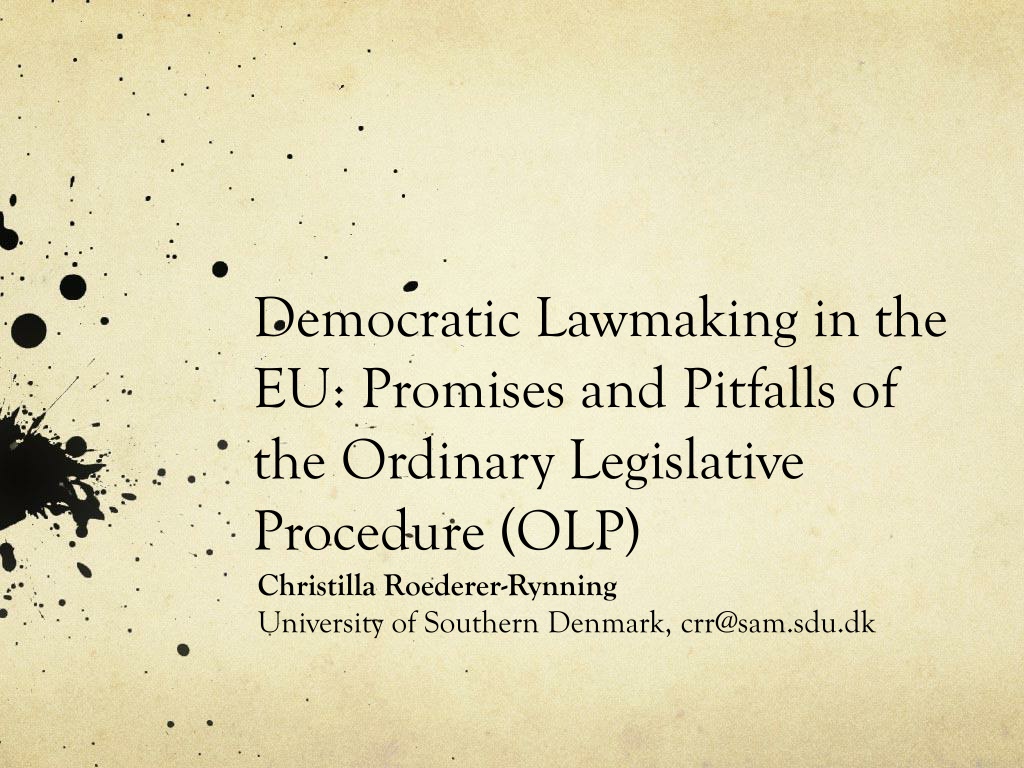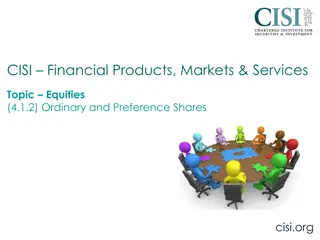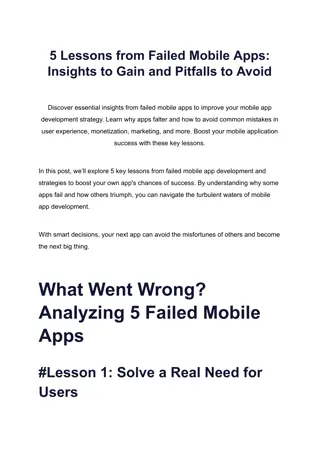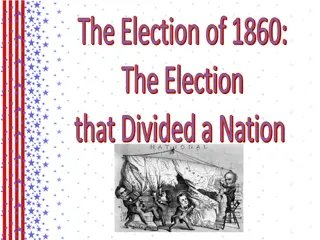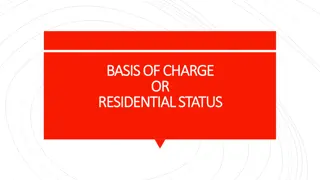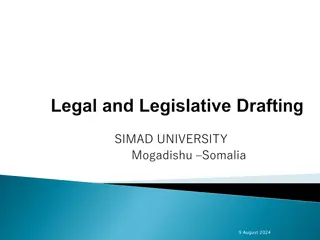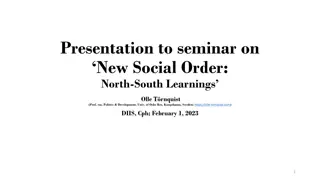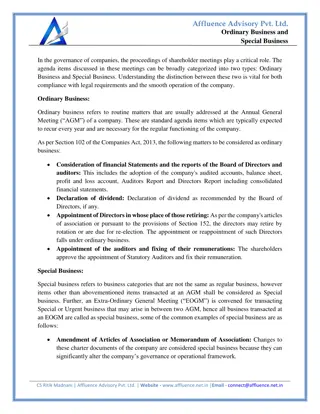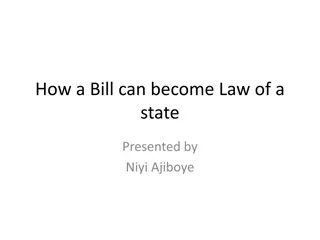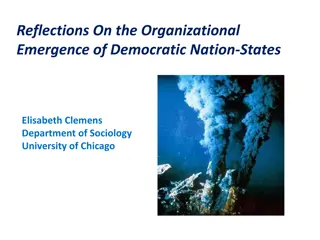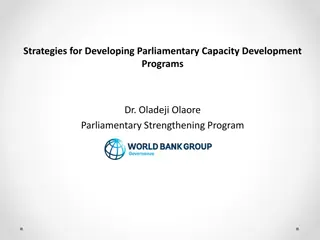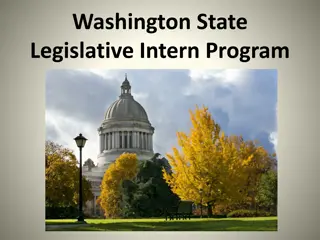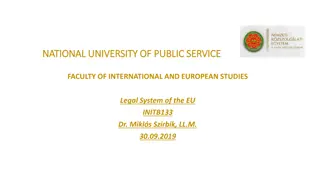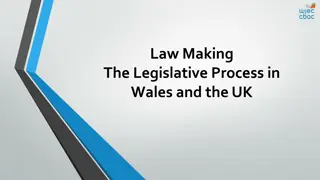Democratic Lawmaking in the EU: Promises and Pitfalls of the Ordinary Legislative Procedure
This presentation explores the evolution and impact of the Ordinary Legislative Procedure (OLP) in the European Union, discussing its democratic innovations and achievements post-Lisbon. Topics covered include the implementation of OLP, its democratic implications, and the use of trilogues as negotiation practices. The analysis considers the balance between efficiency and democratic accountability in EU lawmaking.
Download Presentation

Please find below an Image/Link to download the presentation.
The content on the website is provided AS IS for your information and personal use only. It may not be sold, licensed, or shared on other websites without obtaining consent from the author. Download presentation by click this link. If you encounter any issues during the download, it is possible that the publisher has removed the file from their server.
E N D
Presentation Transcript
Democratic Lawmaking in the EU: Promises and Pitfalls of the Ordinary Legislative Procedure (OLP) Christilla Roederer-Rynning University of Southern Denmark, crr@sam.sdu.dk
Context A distinguishing feature of EU as political union At birth, EU as a messy polity -- 25 years later: To what extent has EU become an orderly polity? What can we learn from OLP? Outline: 1) Making of OLP: democratic innovation?; 2) OLP in practice: democratic achievement?
I. Democratic innovation in Lisbon? a) How innovative is Lisbon? OLP as a procedure: 1) Qualified majority voting in Council ; 2) EP as co-legislator Innovation: New policy areas OLP as a rationalizing device: 1) Ordinary = as default procedure; normal ; 2) Special = as exceptional; abnormal; has to be rationalized => Innovation: Horizontal approach/tidying up
I. Democratic innovation in Lisbon? b) How democratic is this innovation? Policy-seeking perspective: Policy calculations not democratic ideals (utility-maximizing member-states) Legitimacy seeking perspective: The democratic genie out of the bottle (member-states in community of values) Inter-institutional bargaining perspective: Small steps bargaining--in name of democracy? (EP in everyday interactions)
I. Democratic innovation in Lisbon? c) So what is OLP a case of? General sequence of EP empowerment: From values to reflexes (Rittberger 2012): QMV-OLP-Consent Socialization + EP bargaining (H ritier 2015) Individual Lisbon areas: Budget (Benedetto and H yland 2007) role of IGC 2004 Agriculture (Roederer-Rynning and Schimmelfennig 2013 and Trade (Ros n 2016) European Convention 2002-2003
II. Democratic achievements post-Lisbon? a) In practice, OLP = trilogues Trilogues as negotiation practice whereby 3 policy- making institutions reach agreement on EU law Controversial: efficient but undemocratic? EU lawmaking as single reading process: 87% today Private not public: accountability? Informal not formal: ad hoc / expediency v. Rule- based? Alternatives for single market legislation?
II. Democratic achievements post-Lisbon? b) Institutionalization of trilogues (Roederer-Rynning & Greenwood 2015/6) Through practice: across 3 institutions: culture of trilogues (layers of negotiation ritualized); within EP: high-end user committees as driving-force of institutionalization (ECON; ENVI; TRAN) Through rules: EP Reforms of 2012 and 2016: committee / plenary mandate; plurilateralization of team; Monitoring in committee Evolutionary process: Incremental assessment within framework of normal parliament + pace of legislation
II.Democratic achievements post-Lisbon? In hard cases of OLP (2013 agricultural reform): Growing politicization: at intermediary level: growing Civil Society Organization (CSO) mobilization (rural; non-rural)--at multiple levels; of EP parties? and citizen level? Under shadow of member-states: European Council as makeshift legislator? Long-term budget of EU (MFF) as issue detail policy provisions and budget ceilings
II.Democratic achievements post-Lisbon? SO bottom line = Lisbon gains lost in everyday process? GAINS institutional sphere: trilogue rules emerge; intermediary level: civil society engagement; LOSSES institutional sphere: selective exits from OLP intermediary level: parties in search of purpose! HYP Not just agri exceptionalism but redistributive exceptionalism? (agri; econ; libe)
Conclusion Lisbon s democratic aspirations are real even though probably are unintended consequence of deepening of integration Post-Lisbon modus vivendi: democratization of OLP + intergovernmental exits in redistributive issues Not just a messy polity. Political order emerging with democracy / democratization on agenda. With critics from EU democrats and populists, more OLP reform on agenda but institutions alone cannot bring democracy!
Issues ahead Redistributive policies with mixed logic of OLP / intergovernmentalism = How accountable? How tidy? What role for parliaments? Eurozone non Eurozone differentiation = Return of two-speed Europe? What role for the EP? Parliaments? Populism and OLP: OLP central in single market areas!
